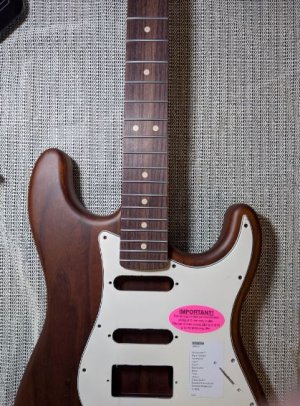Don't use stains or finishing oils like linseed. Rosewood doesn't like any of 'em and at best you'll just gunk up the wood. Worst case you can cause some swelling, warping, and other permanent damage. A gloss poly finish can go on okay, either sprayed or wiped, and certainly will make the wood look a lot darker, but that defeats the object of using raw rosewood...
That neck is already close to as dark as rosewood gets when in good condition. I've had some a slight shade darker but not much. To make it any darker you'll need to 'over-condition' the wood with a decent wood conditioner like Dunlop's 02 Deep Conditioner. (Not the only one on the market but by far the most widely-distributed, so anyone in any country should be able to find it if they can't locate a local alternative.) This is not to be confused with lemon oil, which is mineral oil with a small amount of fragrance and solvent added to clean out dirt—but also 'undoes' some of the moistening effect—and will only maintain the board's current state.
Give the board a thorough clean, apply some conditioner evenly, give it thirty seconds then rub off any excess with an inkless microfibre cloth, or even just rubbing your hand up and down the neck will do. That will get the board as dark as it's ever going to get without a gloss finish. If that's still not dark enough for you then sorry, but that's just the nature of these things; some parts companies do charge a premium for picking out extra-dark rosewood, for this very reason.
If the conditioner works out then hurrah, but don't get tempted to repeat the conditioning very often. A full conditioning shouldn't be done more than once a year, if that. In my experience with rosewood necks (fretboard and shaft) and bodies, if the player has naturally dry skin or a strongly acidic pH balance (healthy skin pH is slightly acidic) then rosewood should be deep conditioned once a year or get a mineral oil/lemon oil wipe-down once every 6-8 months. If the owner has quite oily skin or a more alkaline pH balance then it should only get a mineral oil wipe once a year or a deep conditioning every 18-24 months. Take note that's always conditioning or an oil wipe, not both. Rosewood that's had strong conditioning won't need additional oil until the next conditioning is due and vice-versa if you start out using mineral oils. For my own rosewood necks I alternate, give them a deep condition then after about a year and a half give them a wipe of mineral oil, then after one year give them another deep condition and repeat the cycle.
Conditioning or oiling the neck more frequently than it needs will damage it. Rosewood lets you know when it needs attention by the colour lightening. Don't try to shove more gunk on it 'till it turns middle-brown.


